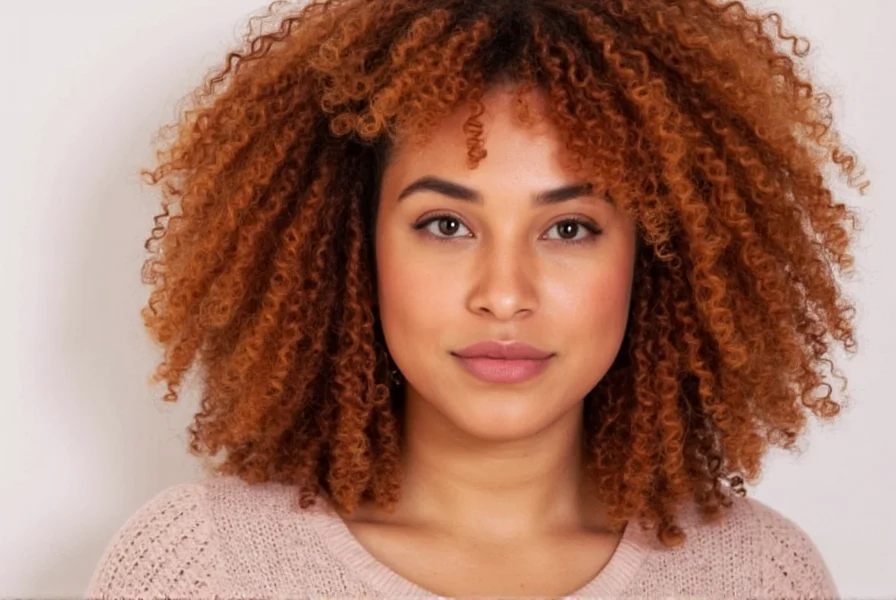Understanding Ginger Hair Possibilities for Black Individuals
When discussing black person ginger hair options, it's important to distinguish between natural occurrence and intentional coloring. While most people associate ginger hair with fair-skinned individuals of European descent, the genetic story is more complex.
Natural ginger hair in Black populations occurs through different genetic pathways than the MC1R gene variant common in European populations. Certain genetic mutations can produce red or auburn tones in people of African descent, though these occurrences remain statistically uncommon. More frequently, Black individuals choose to dye their hair ginger for fashion, personal expression, or cultural reasons.
The Science Behind Hair Color and Skin Tone
Skin undertones significantly impact how ginger hair appears on different complexions. Black individuals typically have warm or neutral undertones that can beautifully complement specific ginger variations. The contrast between dark skin and vibrant ginger creates a striking visual effect that requires careful shade selection.
| Skin Undertone | Recommended Ginger Shade | Effect on Darker Skin Tones |
|---|---|---|
| Warm (golden/olive) | Copper ginger | Creates harmonious contrast |
| Neutral | True ginger | Balanced vibrancy |
| Cool (reddish) | Spiced ginger | Prevents color clash |
Professional colorists specializing in ginger hair for dark skin tones recommend considering your natural hair texture during the coloring process. The density and porosity of Afro-textured hair affects how color absorbs and maintains vibrancy compared to straighter hair types.
Achieving Vibrant Ginger Color Safely
When pursuing black person ginger hair transformation, the process requires specialized techniques:
- Pre-lightening considerations: Many Black individuals need strategic lightening before applying ginger tones. This process must be handled carefully to prevent hair damage.
- Color formulation: Custom mixing accounts for natural pigment in darker hair to achieve true ginger rather than muddy results.
- Processing time: Afro-textured hair often requires longer processing for even color saturation.
"The key to successful ginger coloring for Black clients is understanding that one-size-fits-all approaches don't work," explains Dr. Lena Peterson, trichology researcher. "Each individual's hair history, texture, and current condition requires a customized plan to achieve vibrant ginger while maintaining hair integrity."
Maintenance Strategies for Ginger Hair
Preserving vibrant ginger color requires specific care routines for Black hair:
- Sulfate-free products: Prevent premature color fading while maintaining scalp health
- Color-depositing conditioners: Refresh ginger tones between salon visits
- UV protection: Shield hair from sun exposure that can oxidize ginger tones
- Moisture balance: Counteract drying effects of color processing with deep conditioning
Those exploring how black people can maintain ginger hair should establish a weekly hair care regimen that prioritizes both color retention and hair strength. The vibrant nature of ginger tones means they may fade faster than darker colors, requiring more frequent touch-ups.
Cultural Considerations and Representation
Ginger hair on Black individuals challenges conventional beauty standards and expands representation in media. While historically underrepresented, more Black celebrities and influencers now proudly display ginger hair, inspiring others to explore this vibrant option.
"Choosing ginger hair as a Black person can be a powerful statement of self-expression," notes cultural historian Dr. Marcus Johnson. "It reclaims the narrative that certain hair colors belong to specific ethnic groups and celebrates the beautiful diversity within Black communities."
Addressing Common Concerns
Many considering ginger hair options for black individuals have valid concerns about the process:
- Will it look unnatural? With proper shade selection matching your undertones, ginger can create stunning, natural-looking contrast.
- How damaging is the process? When performed by experienced colorists using quality products, damage can be minimized through proper technique and aftercare.
- How often will I need touch-ups? Ginger typically requires maintenance every 4-6 weeks depending on your hair growth rate and desired vibrancy.
Conclusion
Whether exploring natural ginger occurrences in Black populations or pursuing intentional coloring, understanding the unique considerations for black person ginger hair transformations leads to better outcomes. With proper technique, shade selection, and maintenance, ginger hair offers Black individuals a vibrant option for self-expression that celebrates both heritage and individuality.
Frequently Asked Questions
Can Black people naturally have ginger hair?
Yes, though it's rare. Natural ginger hair in Black individuals occurs through different genetic pathways than the MC1R gene variant common in European populations. Certain genetic mutations can produce red or auburn tones in people of African descent, particularly in regions with historical European admixture.
What's the best ginger shade for dark skin tones?
The ideal ginger shade depends on your specific skin undertones. Black individuals with warm undertones typically look best with copper ginger shades, while those with neutral undertones can wear true ginger tones. Cool undertones often suit spiced ginger variations. Consulting with a color specialist who understands dark skin tones will help identify your most flattering shade.
How damaging is getting ginger hair for Black people?
The damage level depends on your starting hair color and the desired ginger shade. Significant lightening increases potential damage, but experienced colorists use techniques to minimize harm. Using quality products, proper processing times, and establishing a strong hair care routine afterward can significantly reduce damage while maintaining vibrant color.
How often do I need to maintain ginger hair color?
Ginger hair color typically requires maintenance every 4-6 weeks. The vibrant nature of ginger tones means they may fade faster than darker colors. Root touch-ups are usually needed every 3-4 weeks, while full color refreshes maintain vibrancy. Using color-depositing conditioners between salon visits can extend the time between professional appointments.
Does ginger hair require special care for Black hair textures?
Yes, ginger-colored hair requires specialized care for Black hair textures. The coloring process can be more drying, so moisture-rich products are essential. Sulfate-free shampoos prevent premature fading, while UV protection shields the vibrant color from sun damage. Deep conditioning treatments should be incorporated weekly to maintain hair strength and elasticity while preserving the ginger hue.











 浙公网安备
33010002000092号
浙公网安备
33010002000092号 浙B2-20120091-4
浙B2-20120091-4